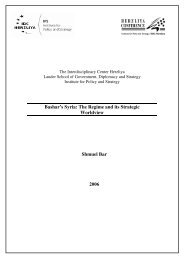Iran: Cultural Values, Self images and Negotiation Behavior
Iran: Cultural Values, Self images and Negotiation Behavior
Iran: Cultural Values, Self images and Negotiation Behavior
You also want an ePaper? Increase the reach of your titles
YUMPU automatically turns print PDFs into web optimized ePapers that Google loves.
<strong>Iran</strong>: <strong>Cultural</strong> <strong>Values</strong>, <strong>Self</strong>-<strong>images</strong> <strong>and</strong> Negotiating <strong>Behavior</strong>there was a tendency to revisit issues that were thought to have been decided already,<strong>and</strong> to unravel the whole package. 139Principle vs. ParticularsThe <strong>Iran</strong>ian attitude towards dealing with principles or details of implementation isnot monolithic. Many Western negotiators claim that <strong>Iran</strong>ian bargaining modusoper<strong>and</strong>i is focused ad nauseum on irrelevant details, <strong>and</strong> shies away from catchallstatements of principles. In a way, this runs contradictory to the <strong>Iran</strong>ian custom offlaunting principles (regarding naval rights, the basis for the <strong>Iran</strong>ian nuclear program,etc.). Indeed other observers, with no less experience, have related long-windedsessions with senior <strong>Iran</strong>ian officials in which the latter dragged the meetings intodiscussions on matters of principle that were ultimately ab<strong>and</strong>oned. 140Short Term vs. Long Term<strong>Iran</strong>ian negotiation techniques are notoriously short-term focused. Very rarely will<strong>Iran</strong>ians offer a deal in which the quid pro quo from the other side will only emergeyears later. In this respect, <strong>Iran</strong>ians are very different to East Asian cultures; they donot seem to see the trust that the deal builds as an asset that may be worth makingconcessions for. The assumption is that the opposite number is as opportunistic <strong>and</strong>cunning as oneself, <strong>and</strong> therefore will not provide the merch<strong>and</strong>ise only because oftrust. U.S. diplomats who dealt with the U.S. embassy crisis of 1979-1980 describedthe <strong>Iran</strong>ian attitude towards long-term confidence-building as follows: “Favors areonly grudgingly bestowed, <strong>and</strong> then just to the extent that a tangible quid pro quo isimmediately perceptible. Forget about assistance proffered last year or even last week.What can be offered today?” 141Length of negotiations<strong>Iran</strong>ians are known for long, drawn out negotiations. One interpretation of thischaracteristic is that the underdog psychology brings the <strong>Iran</strong>ian to assume that thelonger the negotiations last, the greater a chance that things can change in his favor.The intrinsic Shiite belief in the virtue of patience also contributes to this tendency.The American adage that time is money is foreign to <strong>Iran</strong>ian discourse, at least as ageneral principle. It is said that <strong>Iran</strong>ians have, in practice, turned procrastination into avirtue. In personal hierarchical relations, delay is a tactic used by subordinates toavoid implementing decisions they believe to be problematic; in negotiations withnon-<strong>Iran</strong>ians, it has frequently been interpreted as deriving from the assumption thatdelaying decisions may be advantageous. 142 This is not to say that <strong>Iran</strong>ian leaders <strong>and</strong>diplomats have no sense of urgency. During the Iraq-<strong>Iran</strong> War, when <strong>Iran</strong> was in direneed of military materiel <strong>and</strong> held negotiations for purchase of spare parts, <strong>Iran</strong>iannegotiators pressed their interlocutors to continue talks <strong>and</strong> reach a quick conclusion.139 Gi<strong>and</strong>omenico Picco, former U.N. emissary, personal interview.140 For example the <strong>Iran</strong>ian insistence on a declaration of the responsibility of Iraq for the Iraqi-<strong>Iran</strong>ianwar as a precondition for a cease-fire agreement.141 See cable sent to Secretary of State, Cyrus Vance written by the American charge d'affaires, BruceLaingen on 13 th August 1979.142 Arasteh 45–46.40
















